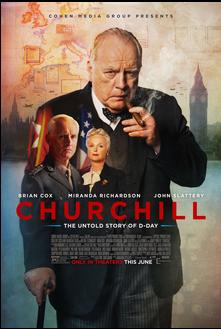2017 is shaping up to be the year of films about Winston Churchill.
For instance, Dunkirk has been an Oscar front-runner ever since it was released last summer. Winston Churchill does not actually appear in Dunkirk but his shadow hangs over the entire film. Whenever Mark Rylance says that he’s doing what the prime minister requested him to do, we know that he’s talking about Winston Churchill.
Darkest Hour, which I hope to see this week, features Gary Oldman in the role of Churchill. For most of the year, a lot of people (like me) assumed that Darkest Hour would be a definite best picture nominee and a probable winner. While the film seems to have lost a little of its luster, everyone still seems to agree that Gary Oldman is not only going to be nominated by best actor but that he also has a pretty chance of finally winning.
However, before either of those films were released, there was Churchill. Chuchill received a very limited release in June. It starred Brian Cox in the title role and it took place in the days leading up to D-Day. It follows Churchill as he struggles with self-doubt. He is haunted by nightmares about the men he lost while a military commander in 1915. He worries that he is being marginalized by the Americans (represented by John Slattery in the role of Dwight D. Eisenhower). He worries that if he authorizes the invasion of Normandy, he’ll run the risk of losing whatever prestige he has left. What if the invasion ends in disaster?
That question right there is the main problem with Churchill. If you know anything about history, you know that the invasion of Normandy was a victory for the Allies, albeit a costly one. Therefore, for this film to maintain any sort of suspense about what ‘s going to happen, it has to be viewed by people who don’t know about history. But people who don’t care about history probably won’t be interested in watching a somewhat stuffy film about Winston Churchill.
Despite a few surrealistic nightmare sequences, Churchill ultimately feels like it belongs more on PBS than a movie screen. It doesn’t surprise me to learn that the majority of director Jonathan Treplitzky’s work has been for British television because Churchill really does feel like a heavily edited version of a 6-hour miniseries. You watch and you’re impressed by the production values and some of the performances but you find yourself wondering if certain have scenes have been cut out. If Churchill had been made for HBO, I imagine that Brian Cox and Miranda Richardson (as Churchill’s wife) would be Emmy front-runners. But, as a feature film, it feels like a decidedly minor portrayal of a major figure.
One final note: all films about the British government during World War II are required to feature at least one scene with King George VI. Colin Firth, in The King’s Speech, remains the best George. Laurence Fox in W.E. was the worst. In Churchill, King George VI is played by James Purefoy. He doesn’t have a big role but he does a good job with it. To be honest, I wish that his role had been bigger because he and Cox are entertaining to watch when they’re acting opposite each other.
